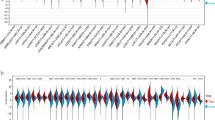Abstract
Background
Cyclin-dependent kinase 5 (CDK5) is a member of the cyclin-dependent kinase family, and unlike the rest of the members of the family, its kinase activity is independent of cyclins. Accumulating evidence has shown that CDK5 plays a significant role in the progress of tumorigenesis except in nervous system. In particular, the expression of CDK5 and its function in esophageal cancer (ESCA) remain unknown.
Methods
With TCGA and GEO databases, CDK5 was analyzed with the expression, predicted value, clinical relationship, functional enrichment, immune cell infiltration and immune molecules in ESCA. In addition, we explored the CDK5 expression with local datasets and the influence of CDK5 on proliferation, migration and invasion behaviors of the esophageal squamous cell carcinoma (ESCC) cells in vitro and in vivo experiments.
Results
CDK5 expression was upregulated in ESCA, and this regulation has been verified in cell lines of ESCC. Further analysis has found that the expression of CDK5 was correlated with race, weight, BMI, histological type and tumor central location in ESCA. KEGG analysis revealed that CDK5 was involved in the progress of cancers, innate immune system and PI3K-Akt signaling pathway. CDK5 was closely related to immune cells and immune molecules in ESCA. Functional experiments confirmed CDK5 was an oncogene in ESCC by in vivo and in vitro models.
Conclusions
This study shows that CDK5 is a risk factor to promote tumor progression, and Roscovitine could be one of the effective tools in the therapy of ESCA.







Similar content being viewed by others
Data availability
The datasets acquired and analyzed in this study are available from the corresponding author.
References
Huang FL, Yu SJ. Esophageal cancer: risk factors, genetic association, and treatment. Asian J Surg. 2018;41:210–5.
Lin Y, Totsuka Y, He Y, et al. Epidemiology of esophageal cancer in Japan and China. J Epidemiol. 2013;23:233–42.
Alsop BR, Sharma P. Esophageal Cancer. Gastroenterol Clin North Am. 2016;45:399–412.
Zheng C, Tang YD. The emerging roles of the CDK/cyclin complexes in antiviral innate immunity. J Med Virol. 2022;94:2384–7.
Wilkaniec A, Czapski GA, Adamczyk A. Cdk5 at crossroads of protein oligomerization in neurodegenerative diseases: facts and hypotheses. J Neurochem. 2016;136:222–33.
Gupta KK, Singh SK. Cdk5: A main culprit in neurodegeneration. Int J Neurosci. 2019;129:1192–7.
Zhou Y, Wang X, Lv P, Yu H, Jiang X. CDK5 Knockdown inhibits proliferation and induces apoptosis and Cell Cycle Arrest in Human Glioblastoma. J Cancer. 2021;12:3958–66.
Sang Y, Li Y, Zhang Y, et al. CDK5-dependent phosphorylation and nuclear translocation of TRIM59 promotes macroH2A1 ubiquitination and tumorigenicity. Nat Commun. 2019;10:4013.
Wang F, Zhao W, Gao Y, et al. CDK5-mediated phosphorylation and stabilization of TPX2 promotes hepatocellular tumorigenesis. J exper clin cancer res. 2019;38:286.
Jin X, Yang C, Fan P, et al. CDK5/FBW7-dependent ubiquitination and degradation of EZH2 inhibits pancreatic cancer cell migration and invasion. J Biol Chem. 2017;292:6269–80.
Szklarczyk D, Gable AL, Nastou KC, et al. The STRING database in 2021: customizable protein-protein networks, and functional characterization of user-uploaded gene/measurement sets. Nucleic Acids Res. 2021;49:D605-d612.
Ru B, Wong CN, Tong Y, et al. TISIDB: an integrated repository portal for tumor-immune system interactions. Bioinformatics (Oxford, England). 2019;35:4200–2.
Chen YC, Hsieh HH, Chang HC, Wang HC, Lin WJ, Lin JJ. CDC25B induces cellular senescence and correlates with tumor suppression in a p53-dependent manner. J Biol Chem. 2021;296:100564.
Lynch SM, McKenna MM, Walsh CP, McKenna DJ. miR-24 regulates CDKN1B/p27 expression in prostate cancer. Prostate. 2016;76:637–48.
Hu M, Gu J, Su W, et al. DNM1: a prognostic biomarker associated with immune infiltration in colon cancer-a study based on tcga database. Biomed Res Int. 2021;2021:4896106.
Donehower LA, Soussi T, Korkut A, et al. Integrated analysis of TP53 gene and pathway alterations in the cancer genome atlas. Cell Rep. 2019;28:1370-1384.e1375.
Huang YF, Niu WB, Hu R, et al. FIBP knockdown attenuates growth and enhances chemotherapy in colorectal cancer via regulating GSK3β-related pathways. Oncogenesis. 2018;7:77.
Liu S, Wang H, Li J, et al. FZR1 as a novel biomarker for breast cancer neoadjuvant chemotherapy prediction. Cell Death Dis. 2020;11:804.
Wang SC. PCNA: a silent housekeeper or a potential therapeutic target? Trends Pharmacol Sci. 2014;35:178–86.
Mollica Poeta V, Massara M, Capucetti A, Bonecchi R. Chemokines and chemokine receptors: new targets for cancer immunotherapy. Front Immunol. 2019;10:379.
Nagarsheth N, Wicha MS, Zou W. Chemokines in the cancer microenvironment and their relevance in cancer immunotherapy. Nat Rev Immunol. 2017;17:559–72.
Garrido F, Aptsiauri N. Cancer immune escape: MHC expression in primary tumours versus metastases. Immunology. 2019;158:255–66.
Funding
This research was supported by grant from the National Natural Science Foundation of China (NO.81601043).
Author information
Authors and Affiliations
Contributions
RL and YS (Yucheng Sheng) completed the experiments. YH, YS (Yucheng Sheng), DW, YS (Yang Shu) analyzed the data. YZ and YS (Yang Shu) designed this work. YS (Yang Shu) wrote this manuscript. All the authors contributed to reading and revising the manuscript.
Corresponding authors
Ethics declarations
Ethical Statement
This study with human tissues was approved by the ethics committee of the Affiliated Hospital of Jiangsu University. The procedures with human tissues were performed as ethical standards of the ethics committee, the Helsinki Declaration of 1975 and its later amendments(ethical code:KY201902).
Conflict of interest
All the authors declare that there is no conflict of interest in this paper.
Additional information
Publisher's Note
Springer Nature remains neutral with regard to jurisdictional claims in published maps and institutional affiliations.
Supplementary Information
Below is the link to the electronic supplementary material.
Rights and permissions
Springer Nature or its licensor (e.g. a society or other partner) holds exclusive rights to this article under a publishing agreement with the author(s) or other rightsholder(s); author self-archiving of the accepted manuscript version of this article is solely governed by the terms of such publishing agreement and applicable law.
About this article
Cite this article
Ling, R., Sheng, Y., Hu, Y. et al. Comprehensive analysis of CDK5 as a novel biomarker for progression in esophageal cancer. Esophagus 20, 502–514 (2023). https://doi.org/10.1007/s10388-023-00988-z
Received:
Accepted:
Published:
Issue Date:
DOI: https://doi.org/10.1007/s10388-023-00988-z




